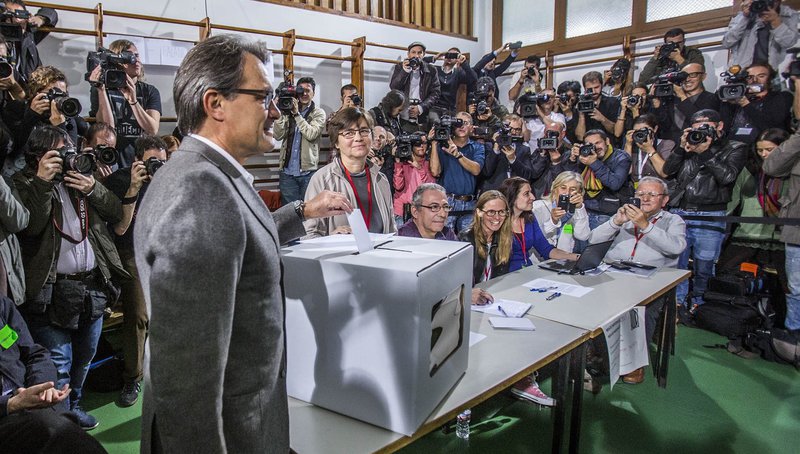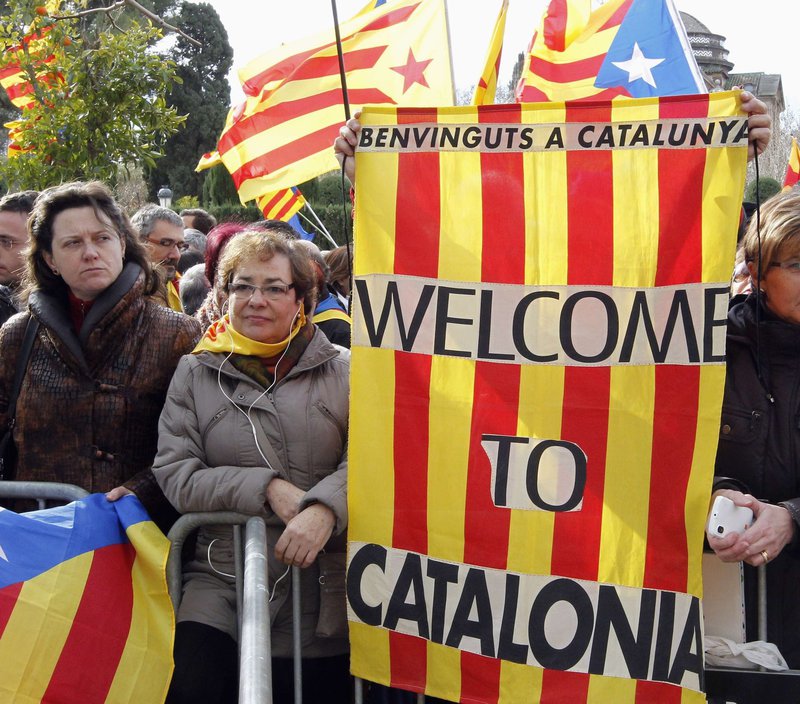Beyond our borders
Catalonia has gone from almost no international press coverage to an issue of interest due to the process
Any Catalan who has travelled around the world must have noticed it. Up until only a few years ago, Catalans abroad had to spend an age explaining where they were from before settling for Barcelona, whether true or not. Today, things have changed and travellers increasingly meet more people abroad who not only know what Catalonia is, but are even aware and interested in the sovereignty process.
The question is, what caused this change of perception? The tendency among Catalans to travel and move abroad has helped in spreading the message, but the main contribution recently has been the interest in the international press for the sovereignty process in Catalonia. In fact, the issue has gone from the odd mention in the foreign media, usually on the back of another subject such as the 1992 Olympics, to more extensive coverage. However, not all of this attention has been positive as, for example, when Catalonia was blamed for Spain's poor financial situation, albeit without explaining the chronic fiscal deficit.
This set off alarm bells and, in April 2009, the first initiative to rectify Catalonia's image problems began. The voluntary organisation Col·lectiu Emma, began collating references to Catalonia in the foreign media to provide a response. Since then, the group has forged contacts with journalists and media outlets abroad and has made its findings available on the net.
Xammar and Diplocat
The group continues to do the same work, but since September 2012 the government has been more involved in promoting Catalonia abroad. First, there was the creation of the Eugeni Xammar programme, named after the 20th century Catalan correspondent. This initiative aimed to create an international office for media and public relations, though the project was left half done due to a lack of funds and has focused on providing support to the Generalitat's foreign office. Then, at the start of 2013, the Patronat Catalunya-Món was turned into the Consell de Diplomàcia Pública de Catalunya (Diplocat), a semi-private body that set about making contacts with foreign organisation and media outlets.
Between them, the initiatives have led to diplomatic visits by foreign public figures and journalists, who have seen the reality of the country first-hand and spoken to government officials. Also, a dozen or so conferences have been organised to debate the sovereignty process in different European universities (including Spanish ones) and, since 2013, two score opinion articles on the subject have appeared in the foreign media by high-profile figures such as Artur Mas or the economy minister, Andreu Mas-Colell.
“It remains a minor issue for them, but in general we have found a good willingness to engage,” says Diplocat's Martí Estruch, who stresses the success of visits by foreign journalists, despite initial doubts. “They do not want to feel strong-armed, but it is a journey of discovery, not propaganda,” he adds.
What is also true is that many initiatives have received a response from the Spanish government, which has applied pressure to prevent events taking place abroad. One example was the unsuccessful attempt in Lisbon and another was the Utrecht event, where the government prevented the presentation of the novel, Victus. Moreover, the Spanish authorities have promoted articles from ambassadors in places like London, Rome and Reykjavik, where a recent article openly criticised Mas writing in the foreign media. In fact, Diplocat reports that Spanish ambassadors put pressure on the media to ignore Catalan demands, sometimes with success, especially smaller outlets.
That the rise in Catalonia's international profile has coincided with the sovereignty process and the Scottish referendum has helped capture the attention of the international press: “The Scottish debate did not reach its high point in the international press until a poll appeared forecasting a 'yes' vote, but here the conflict is a permanent one and the coverage has been more linear,” says foreign secretary, Roger Albinyana. And so far there has been no falling away of interest, as can be seen from the likes of the prestigious US magazine, Newsweek, starting 2015 by including the Catalan situation among its top ten world issues for the year.
Favourable editorials
Yet, overall the government is positive about the country's international profile, especially with a number of influential foreign media outlets declaring in favour of the right to decide (though not independence).
“In the past few months there have not only been news items evaluating the situation, but also editorials explicitly calling for negotiations between the Spanish and Catalan governments to find a solution that respects the will of the Catalan people,” says Albinyana, who adds: “It is extremely important and undeniable progress.”
While the majority of these articles seem to support a federal model or one based on fiscal agreement, they also express confusion and criticism of the Rajoy government's unwillingness to offer alternatives, which in their eyes provides more legitimacy to the sovereignty thesis.
After a couple of months of deadlock, the agreement on January 14 to call plebiscite elections on September 27 and the setting of an 18-month road map towards independence has returned the Catalan issue to the media front line. Outlets such as the Financial Times, the Wall Street Journal, the BBC, Euronews, the US CNBC, Germany's Die Welt and even Vatican Radio have all reported on the issue, along with news agencies such as the Associated Press, Reuters, France Press or Ansa, all used by many media outlets around the world. All of this opens the way to a new analysis, in which party squabbling is seen as an obstacle to the process and the rise of Podemos could radically change expectations, both in Catalonia and in Spain as a whole.
Whatever happens next, international media coverage of the situation is an important element in the process and, in the opinion of Estruch “Catalonia has already won the game.”
Catalans raise stakes on secession with early polls
Spain's political establishment faces an unprecedented political challenge on two fronts: in Catalonia, the popular party and the socialists risk being sidelined by the pro-independence movement and by more hardline unionist forces such as Ciutadans. At the same time, they are under fierce pressure from Podemos, the upstart anti-establishment party founded only one year ago. (14/01/15)
Catalonia leader Artur Mas probed over independence vote
Catalonia's High Court said it would open proceedings against Mr Mas for allegedly disobeying a constitutional ban against the vote.
The 9 November vote, which was not binding, went ahead despite fierce opposition by the Spanish government.
Catalan officials say more than 80% of those who voted backed independence. (22/12/14) BBC
Independent Catalonia Would Have Investment Grade: Study
Catalonia would recover its investment-grade credit rating if it reached agreement on independence from Spain, says a study by an economists' group from the region. The region's government would merit an A+ rating, Standard & Poor's fifth-highest grade, if it was released from its obligations to Spain, according to the study carried out by Joan Elias Boada, a former economist at La Caixa. (28/01/15)
Catalonia wants definitive vote in referendum like Scotland's
The question in Catalonia is why Catalans cannot vote in a legal referendum like in Scotland and Quebec. Are we second-class citizens? Out of respect for the democratic values that we share with the rest of Europe, I believe we have reached the point where we need to ask this question beyond our borders, and move beyond the point where “It's an internal matter for Spain to resolve.” (26/11/14)
Madrid rejects fresh Catalonia freedom bid
Spain's government has rejected Catalonia's calls for self-determination after more than two million people took part in a symbolic vote on independence for the region. Catalonia's leader Artur Mas has reached out to Madrid for talks on a “definitive” and binding vote, but the national government, which had tried to ban Sunday's ballot, is in no mood to oblige. (11/11/14) AL JAZEERA
Ten leading international figures say let the Catalans vote
Ten leading international figures called today for the Catalans not to be presented from voting on their political future, by signing a Manifesto, “Let Catalans Vote”. The list of ten individuals who support the Manifesto is topped by two Nobel Peace Prize laureates, South African Archbishop Desmond Tutu Argentinian Adolfo Pérez Esquivel, and continues with film director Ken Loach. (01/11/14) www.letcatalansvote.org/
Let democracy take its course (Artur Mas)
I (therefore) call on Spain's government, and also on Spain's people, to listen to the people of Catalonia. The hour has come and our whole hearts are in this. I also call on the international community to urge President Rajoy and Spain's parliament to allow Catalonia to choose its own system of government, for ourselves and for our children. (12/11/14)
A joint effort of promotion
The task of promoting Catalonia abroad has recently gained momentum and has become something of a joint project between the public authorities and private individuals and organisations. In April, for example, the official website, cataloniavotes.eu, was begun to provide news and information about the sovereignty process, as well as other Catalan issues that might be of interest abroad. The site also includes contact, such as relevant public and private Twitter profiles considered to be appealing to a foreign audience. At the same time, a number of media outlets, such as El Punt Avui, Vilaweb and the ACN news agency, are now offering some of their content in English, partly as a way of satisfying the growing interest in the Catalan situation abroad. At the same time, the Incat news agency informs Latin America on Catalan issues.
Why Catalans desperately hope Scotland will vote 'yes'?
In Barcelona, David Cameron is regarded as something of hero for allowing Scots to vote. Why, they ask, will the Spanish prime minister in Madrid, Mariano Rajoy, whose politics are similar to Cameron's, not afford Catalans the same privilege? The answer is simple: Scots have been granted their referendum because a pro-Union Westminster government doesn't think they will vote in favour. (16/08/14)











